
HUDSON REVIEW
Scope & Guideline
Exploring the Depths of Literary Insight
Introduction
Aims and Scopes
- Poetry and Creative Writing:
The journal consistently features a wide range of poetic forms and styles, encouraging both established and emerging poets to explore and express complex themes through their work. - Cultural and Literary Criticism:
It provides critical essays that reflect on literary works, historical contexts, and cultural movements, aiming to deepen the understanding of literature within the broader cultural landscape. - Interdisciplinary Approaches:
The Hudson Review often intersects various disciplines such as art, history, philosophy, and politics, showcasing how these fields influence and enrich literary discourse. - Thematic Exploration:
The journal focuses on specific themes that resonate with contemporary issues, exploring how literature reflects and shapes societal narratives. - Historical Contextualization:
It frequently revisits historical literary figures and movements, providing insights into their relevance and impact on modern literature.
Trending and Emerging
- Personal and Memoiristic Writing:
There is a rising trend in the publication of personal essays and memoirs that delve into individual experiences, reflecting broader societal issues and personal truths. - Environmental and Climate Literature:
The journal has begun to include more works addressing environmental themes, climate change, and ecological awareness, highlighting literature's role in fostering social consciousness. - Intersectionality in Literature:
Emerging discussions around intersectionality, particularly in terms of race, gender, and identity, are gaining traction, reflecting a more inclusive literary dialogue. - Digital and Visual Literature:
The incorporation of digital forms and visual elements in literature is on the rise, showcasing innovative approaches to storytelling and reader engagement. - Poetic Experimentation:
A growing number of experimental poetic forms and non-traditional structures are being featured, indicating a shift towards avant-garde and contemporary poetics.
Declining or Waning
- Traditional Narrative Forms:
There has been a noticeable reduction in the publication of works adhering strictly to traditional narrative structures, as the journal shifts towards more experimental and innovative literary forms. - Formal Literary Criticism:
The journal's engagement with formalist criticism, which emphasizes the technical aspects of literature, seems to be less frequent as the focus broadens to include more subjective and thematic interpretations. - Historical Literary Analysis:
Although historical context remains important, there has been a decline in essays that strictly analyze historical texts or authors, indicating a move towards contemporary relevance and personal narrative. - Genre-Specific Discussions:
The journal appears to be moving away from discussions centered around specific literary genres, favoring a more eclectic and inclusive approach that transcends traditional genre boundaries. - Regional Focus:
There has been a diminishing emphasis on region-specific literary discussions, as the journal increasingly embraces a global perspective on literature.
Similar Journals
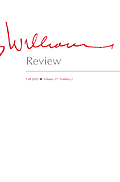
WILLIAM CARLOS WILLIAMS REVIEW
Celebrating the profound impact of a literary pioneer.WILLIAM CARLOS WILLIAMS REVIEW, published by Penn State University Press, is a distinguished academic journal dedicated to the exploration of the life and works of the influential American poet and physician, William Carlos Williams, as well as broader themes in modernist literature. With its ISSN 0196-6286 and E-ISSN 1935-0244, the journal provides a platform for critical essays, scholarly analyses, and innovative research that contribute to the understanding of Williams's contributions to the literary canon and their relevance in contemporary literary studies. Although it is not an Open Access journal, its rigorous editorial standards and commitment to high-quality scholarship make it a valuable resource for researchers, educators, and students in the fields of English literature and cultural studies. By publishing engaging discourse that bridges historical context and modern interpretation, the WILLIAM CARLOS WILLIAMS REVIEW stands out as an essential journal for those interested in the intersections of poetry, medicine, and society.

NOVYI MIR
Cultivating Insight into Contemporary Cultural IssuesNOVYI MIR, published by IZD STVO IZVESTIYA, is a distinguished journal that provides a platform for scholarly discourse in the humanities, literature, and cultural studies. With an ISSN of 0130-7673, this journal has made significant contributions to the academic community, particularly within Russia and Eastern Europe. Although it does not currently offer an open access model, its content is revered for its quality and depth, catering to researchers, professionals, and students alike. With a commitment to examining contemporary issues through a literary lens, NOVYI MIR is essential for those seeking to explore the intersection of culture and society. The journal's relevance is underscored by its esteemed reputation in literary circles, making it a vital resource for anyone dedicated to understanding the nuances of Russian literature and thought.
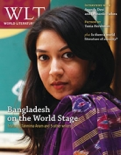
WORLD LITERATURE TODAY
Transforming Understanding of Literature Across BordersWORLD LITERATURE TODAY, published by UNIV OKLAHOMA PRESS, is a premier journal dedicated to the exploration of global literature and its multifaceted cultural implications. With an ISSN of 0196-3570 and an E-ISSN of 1945-8134, this periodical has established itself as an important platform for scholars, writers, and cultural critics from around the world. Since its inception, it has successfully navigated through a diverse array of literary theories and practices, contributing significantly to the discourse within the field, as evidenced by its Q3 ranking in Literature and Literary Theory. Despite its ongoing tenure that extends from 2002 to 2024, it offers no open access options, emphasizing the value of its curated content. Positioned within the United States and housed in the historic UNIVERSITY PRESS BUILDING in Norman, Oklahoma, WORLD LITERATURE TODAY continues to engage and challenge its readers, making it an essential resource for those passionate about the nuances of literature across cultural contexts. Its unique blend of critical essays, interviews, and reviews makes it indispensable for researchers, professionals, and students alike who seek to enrich their understanding of the literary world.
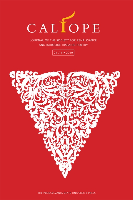
Caliope-Journal of the Society for Renaissance and Baroque Hispanic Poetry
Revealing the Intricacies of Renaissance and Baroque VoicesCaliope: Journal of the Society for Renaissance and Baroque Hispanic Poetry is a prestigious academic journal published by Penn State University Press, dedicated to exploring the rich tradition of Hispanic poetry from the Renaissance and Baroque eras. With an ISSN of 1084-1490 and an E-ISSN of 2377-9551, this journal serves as a vital resource for scholars and enthusiasts of the field, particularly within its converged years of 2019 to 2023. Ranking in the Q2 and Q3 quartiles across various categories such as History, Literature and Literary Theory, and Linguistics, Caliope has positioned itself as a significant contributor to the academic discourse surrounding Hispanic poetic traditions and their historical context. While the journal is not currently open access, it provides in-depth analyses and innovative research that are crucial for both current scholars and future researchers in the humanities. Engage deeply with the rhythmic and cultural expressions of a transformative period in literature and join a community that values the intricate beauty and societal reflections of Renaissance and Baroque Hispanic poetry.
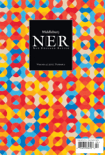
NEW ENGLAND REVIEW-MIDDLEBURY SERIES
Advancing the Dialogue of Classic and Contemporary NarrativesNEW ENGLAND REVIEW-MIDDLEBURY SERIES, published by MIDDLEBURY COLLEGE PUBLICATIONS, stands as a significant contributor to the field of literature and literary theory since its inception in 2002. This journal, holding an ISSN of 1053-1297 and an E-ISSN of 2161-9131, offers a platform for innovative literary scholarship that resonates with contemporary discourse while fostering an appreciation for classic narratives. Though classified in Q4 in the category of Literature and Literary Theory as per the 2023 rankings, it aims to enhance its visibility and impact within the academic community. With a current rank of #1046 out of 1106 in Scopus Arts and Humanities, it invites researchers, professionals, and students alike to submit their work, engage in the literary dialogue, and explore the rich spectrum of human experience through literature. While it operates without open access options, the journal remains committed to high-quality contributions that push the boundaries of literary analysis and theory.

LITERATUR UND KRITIK
Bridging Tradition and Innovation in Literary CritiqueLITERATUR UND KRITIK, published by Otto Muller Verlag, stands as a significant journal in the field of Literature and Literary Theory. This Austrian journal, with its ISSN 0024-466X, offers a platform for critical examination, analysis, and discourse on literature from various historical and cultural contexts. Despite its current standing in the Q4 category of literature rankings, it provides an invaluable resource for researchers and practitioners committed to exploring the evolving landscape of literary criticism. This journal is particularly notable for its convergence of scholarly thought from 2009 to 2024, fostering a rich dialogue among academics, critics, and students alike. While it does not offer open access, its valuable insights into contemporary and historical literary studies make it a respected source within the academic community. The journal ensures that contributors and readers alike engage deeply with significant literary themes, nurturing both scholarly and creative pursuits.

KENYON REVIEW
Unveiling the Depths of Literature.KENYON REVIEW is a distinguished literary journal published by Kenyon College, nestled in the heart of Gambier, Ohio. Since its inception, the journal has served as a vital platform for emerging and established voices in the field, contributing significantly to the discourse in Literature and Literary Theory. With its ISSN 0163-075X and E-ISSN 2327-8307, the journal not only showcases a rich tapestry of literary criticism, poetry, and fiction but also emphasizes innovative perspectives on the evolution of literary studies. Though it has encountered fluctuations in its presence, as indicated by its current placement in Q4 quartile within its field and a Scopus rank of #1055 out of 1106, the journal retains its commitment to academic excellence. The KENYON REVIEW is essential reading for researchers, professionals, and students seeking to deepen their understanding of contemporary literary trends and theories. Its comprehensive approach ensures a diverse array of scholarly contributions, making it a pivotal resource in the arts and humanities.

CAMBRIDGE QUARTERLY
Cultivating a Rich Landscape for Literary ScholarshipCAMBRIDGE QUARTERLY, published by Oxford University Press, stands as a dedicated outlet for scholarly discourse in the realm of Literature and Literary Theory. Since its inception in 1965, this journal has fostered a rich landscape for academic inquiry and discussion, with a commitment to exploring the intricate dynamics of literary studies up to 2024 and beyond. With an ISSN of 0008-199X and an E-ISSN of 1471-6836, CAMBRIDGE QUARTERLY offers a platform for innovative research, although it currently does not provide open access options. The journal is noted for its scholarly contributions, ranking in the Q4 quartile within its category based on the 2023 metrics, and holds the 635th rank in Scopus for Arts and Humanities specifically focused on Literature and Literary Theory, placing it in the 42nd percentile. As such, it appeals to researchers, professionals, and students alike, seeking to deepen their understanding of literary discourse and theoretical frameworks.

OVERLAND
Advancing Understanding of Contemporary Literary LandscapesOVERLAND is a distinguished journal published by O L Society Ltd in Australia, focusing on the fields of Literature and Literary Theory. With an ISSN of 0030-7416, this journal has been pivotal in fostering scholarly discussions and critical analyses within its domain. Notably categorized in the third quartile (Q3) in 2023, it ranks #904 out of 1106 in Scopus' Arts and Humanities section, indicating its emerging significance in literary studies, despite its current percentile of 18th. OVERLAND is not an open access journal, yet it serves as a crucial platform for researchers, professionals, and students alike, promoting a better understanding of contemporary literary landscapes. With a history of publication spanning from 2009 to 2013 and then again from 2015 through 2023, OVERLAND continues to encourage innovative scholarship and critical dialogue. This journal is essential for anyone seeking to deepen their understanding of literature's role in society and culture.
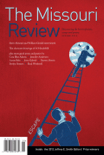
Missouri Review
Where Emerging Voices Meet Established Thought.The Missouri Review, published by the University of Missouri, College of Arts and Science, is a prominent literary journal that serves as a platform for innovative and diverse voices in literature and literary theory. Established as a key publication within the United States, it holds an ISSN of 0191-1961 and an E-ISSN of 1548-9930, reflecting its reach in both print and digital formats. With a current ranking in the Q4 quartile for the year 2023, the journal is positioned in the lower echelon of the literature field as per Scopus rankings, emphasizing the growth potential for emerging scholars and established authors alike. The Missouri Review actively contributes to the scholarly discourse in literature, aiming to enhance understanding through the publication of original short stories, essays, and poetry that challenge and refine literary conventions. Researchers, professionals, and students interested in contemporary literary developments and trends should consider this journal a vital resource for insights and inspiration.